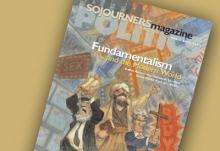A biblical framework for understanding money's grip on us -- and how to break free.
Money

Socially responsible investing has morphed into a $2 trillion mainstream industry.

How community-based investing transforms individuals - and religious institutions.
Advocates of campaign finance reform approach the issue from two different strategic perspectives: Abolitionism and incrementalism. Abolitionists espouse comprehensive reform - full public financing that removes all private money from the electoral process. They see money in politics as a raging river - dam it at one point and it will create a new riverbed elsewhere. Under the name of the Clean Money, Clean Elections (CMCE) reform, public financing is successful law to varying degrees in four states.
A federal "clean elections" bill has been introduced that, like the state bills, gives public financing to qualified candidates who agree not to take campaign contributions from private sources (except for a limited number of small "qualifying" contributions that serve to establish eligibility for the full public stipend). Right now, the federal bill lacks the grassroots support to make it a pressing issue.
The difficulty of passing a comprehensive public financing bill is why many reformers choose the incremental approach. On the assumption that it is better to pass a limited bill than no bill at all, they hope to reform the system in stages. The 2002 McCain-Feingold bill (officially known as the Bipartisan Campaign Reform Act or BCRA), is their primary accomplishment. It is meant to prohibit "soft money," the hundreds of millions of dollars that corporations, labor unions, and wealthy individuals launder through unregulated state parties for use in federal elections.
Many abolitionists predicted that McCain-Feingold would prove to be one big loophole that would spawn new conduits for soft money and dilute efforts to build popular support for comprehensive public financing.

William Gates Sr.—whose son is Microsoft founder Bill Gates—joins with co-author Chuck Collins to argue that the wealthiest among us have an obligation to pay their fair share.
Americans are looking for socially responsible corporations, but many corporations haven't yet caught on.
54 percent of global billionaires are in the United States
Grameen Bank operates beyond the bottom line to benefit those at the bottom of the line.
Let the good times roll! President Bill Clinton was absolutely beaming as he reported the U.S. Census Bureau's annual poverty statistics.
This morning's Washington Post said it is a "workers' market." A booming U.S.

The Hebrew Bible's vision of Sabbath economics contends that a theology of abundant grace and a communal ethic of redistribution is the only way out of our slavery to the debt system, with its theology of meritocracy and private ethic of wealth concentration. The contemporary church, however, has difficulty hearing this as good news since our theological imaginations have long been captive to the market-driven orthodoxies of modern capitalism.
Our fears have persuaded us that the biblical Jubilee is at best utopian and at worst communistic. Yet we find it awkward simply to dismiss the biblical witness, so an alternative objection inevitably arises, as if on cue: "Israel never really practiced the Jubilee!" If genuine, and not simply a strategy of avoidance, this challenge is best addressed by considering both the "negative" and "positive" evidence.
By "negative" evidence I mean the fact that Israel's prophets repeatedly and relentlessly criticized the nation's leadership for betraying the poor and vulnerable members of the community. This strongly suggests that the Sabbath vision of social and economic justice remained a measuring stick to which they could publicly appeal.
There can be no question that the Sabbath disciplines of seventh-year debt release and Jubilee restructuring were regularly abandoned by those Israelites who wished to consolidate social advantages they had gained. The historical narratives in the Hebrew Bible indicate that as the tribal confederacy was eclipsed by centralized political power under the Davidic dynasty, economic stratification followed inexorably. Indeed, the prophet Samuel warned that a monarchy would be linked intrinsically to an economy geared to the elite through ruthless policies of surplus-extraction and militarism (1 Samuel 8:11-18).



